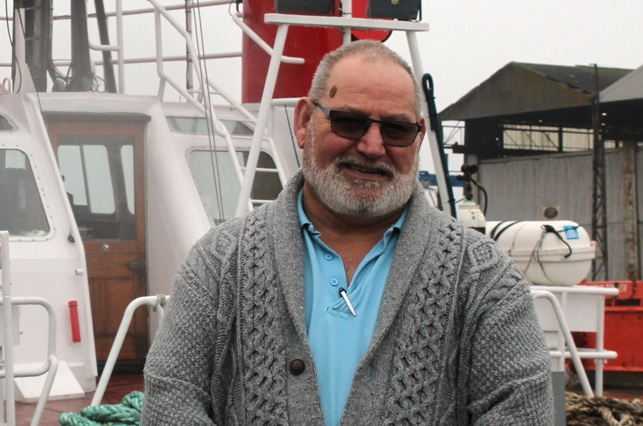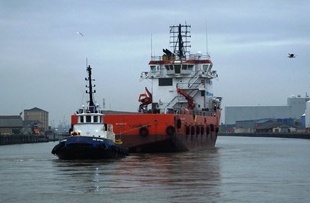Yarmouth Chaplain prioritises welfare of stranded crew
Port Chaplain the Revd Peter Paine and his team at the Mission to Great Yarmouth Seafarers Centre are providing vital and varied support to the unfortunate crew of the Malaviya Twenty, the arrested Indian vessel stranded in Great Yarmouth Port, as concern over welfare increases. Jenny Seal reports.
 Baptist minister the Revd Peter Paine has been the Port Chaplain in Great Yarmouth for 16 years, funded by Good Work, a charity providing workplace chaplaincy services, and the Mission to Seafarers. He describes his role as a friend to all who enter the Port, providing a listening ear and being an advocate for seafarers in whatever circumstances they may need it.
Baptist minister the Revd Peter Paine has been the Port Chaplain in Great Yarmouth for 16 years, funded by Good Work, a charity providing workplace chaplaincy services, and the Mission to Seafarers. He describes his role as a friend to all who enter the Port, providing a listening ear and being an advocate for seafarers in whatever circumstances they may need it.
He carries out the role with diligence and passion, providing practical, pastoral and spiritual care, sometimes around the clock, for seafarers passing through the Norfolk port.
For almost two years a significant amount of his time has been taken up with the plight of the Malaviya Twenty crew.
The offshore supply vessel, the Malaviya Twenty, has been stranded in the Port of Great Yarmouth since June 2016, embroiled in a legal battle over liquidation. The future is uncertain, as multiple agencies wrangle over the ship including the port authority, the insurance company, the owners, the Indian courts and the Admiralty Marshall.
In February 2017 it looked as if the situation had been resolved. A new crew of 14 Indian seafarers and their Captain came aboard expecting to take the vessel back to Mumbai. They were never given the go-ahead. 11 of these crew members, some with Peter’s help, have flown home and the ship is now manned by a skeletal crew of four, far below the minimum manning deemed suitable for a vessel of its size.
Over the past few months Peter has become increasingly concerned about the welfare of the seafarers. He said, 'The crew have not been paid since September last year. They are running on the goodwill of the Captain and his bank account. Since the turn of the year the physical, mental and spiritual welfare of the crew has taken a dive.
'I have to say that after all this time my heart goes out to them in a big, big way... I think the whole thing is a travesty of justice really. It really is.'
Over the course of the last two years Peter, as Port Chaplain, has raised funds, coordinated appeals, helped crew members to fly home, organised social opportunities, drank countless cups of tea with the crew and advocated on their behalf with the authorities.
One concern that is pressing is where the fuel will come from when its current supply runs out.
Peter said, 'When Indian ships pull into the port they all know of the Malaviya Twenty and her plight. One pulled in recently and straightaway sent their Chief Engineer up. He found a way of closing down their auxiliary power unit to start up a smaller one which will eke the fuel out for two months.
'But when that runs out we don’t know where the next proper fuel is going to come from. We put £2.5k worth of fuel on at Christmas but that only lasted about 10 days. We can’t afford to do that again.'
He continues, 'In order to save power they’ve had to turn off the range in the galley so they don’t use that at all. They have bought themselves two little grills so you can imagine what kind of food they are living on at the moment. They are used to having two good meals a day and a good breakfast, but they are not getting that.'
The crew have a work schedule devised by the Captain to keep the ship clean, tidy and operating as well as it can. But even with these best efforts to keep busy, morale is dropping.
On the evening of Thursday, April 26 Peter, his wife Pat and Ships’ Visitor Colin Wooden went on board with fish and chips to enjoy with the crew. 'I introduced them to vinegar and red sauce,' he said. 'That went down a treat; the pickled onions not too well!'
They have previously enjoyed a curry night together and over Christmas had an outing to the circus. Peter said, 'Little things like that, that you do for them, it does lift them a little bit. It gives them a chance to get out of their working gear and get into normal clothes. Because otherwise they stay in their working gear most of the time because they haven’t got anything to change for.'

The situation of the crew is complex. Under maritime law the Captain is obligated to stay with the ship indefinitely. Peter said, 'If he were to walk away he would be culpable for desertion once he gets back to India. He could either have a prison sentence or he would just be blacklisted from further work.'
The three seafarers have built a deep loyalty to their Captain, especially after living off his personal funds for so long. The Captain, a proud, strong man keenly aware of his responsibilities, is reticent to accept charity.
Peter said, 'If I asked the people of Yarmouth to donate things for them, I know we could fill this place up in next to no time. But until I know that it will be accepted, it’s no good.'
'I’ve got small pockets of charity money here there and everywhere,' he said. 'I tell them every time I go on board, ‘if you don’t have it I’ve got to give it back. And if I give it back we’ve lost it’. I think I’ve worn him [the Captain] down to such a state that he is just about ready to take some but he’s not said yes yet.'
For much of its time in Port the boat was moored outside the Great Yarmouth Seafarer’s Centre where Peter and his team are based, making it easy for them to regularly go on board and have a chat.
Peter said, 'This crew have got nothing but you go on there and you are made so welcome. Before you know it you’ve got a cup of tea or coffee, and they bring out a whole plate of biscuits. The hospitality that you still get on board is wonderful for the situation they are in.'
But in February after the ship’s certification to work ran out the Port Authority moved the boat to the Outer Harbour, where the small crew were confronted with the ‘Beast from the East’.
Peter said, 'She was just like a cork in a bathtub. She was being battered and bruised all over the place. Six lines broke in that time. They couldn’t get their gangplank down to get it onto shore so no one could get on or get off. I actually feel that the experience that they had out there – which wasn’t a nice experience – that has helped to put them down a lot now. If these boys go back to sea again they are going to be traumatised by the whole event that’s happened here that they had no control over.'
Peter spoke up for the ship and publically highlighted his concerns. In April the Malaviya Twenty was moved back to its current position in a secure berth in Yarmouth’s Port.
While the various agencies involved disagree about the finances surrounding the vessel and how to resolve the debts owed, Peter, as Port Chaplain, is providing a critical role caring for the crew and their welfare.
With characteristic straight-talking Peter said, 'I don’t give two figs about the ship, I really don’t. I’m desperate to get the crew off, paid and repatriated home. They’ve suffered enough. And the trouble is that while this merry-go-round continues to go round they are going to suffer more.'
Audrey Sharp, Chair of Good Work, said, 'We are so pleased Peter is in the right place to help this crew when they need it most. Our job is to show God’s love by caring for people in the work place in whatever way we can. This is the most serious situation we’ve had to deal with and we pray it will soon be resolved for the sake of the well-being of the crew and their families back home.'
Inset photo of the Malaviya Twenty used with the permission of Colin Wooden
Peter’s salary as Port Chaplain for Great Yarmouth is part funded by the Christian Charity Good Work (Norfolk and Waveney Industrial Mission). Donations can be made to ‘Good Work’ by cheque to its registered office at 109 Dereham Road, Easton Norwich, NR9 5ES. All help would be gratefully received.
The Great Yarmouth Seafarers Centre is funded separately as an independent local charitable organisation.
This article first appeared on Network Norfolk and is republished with permission
Baptist Times, 10/05/2018